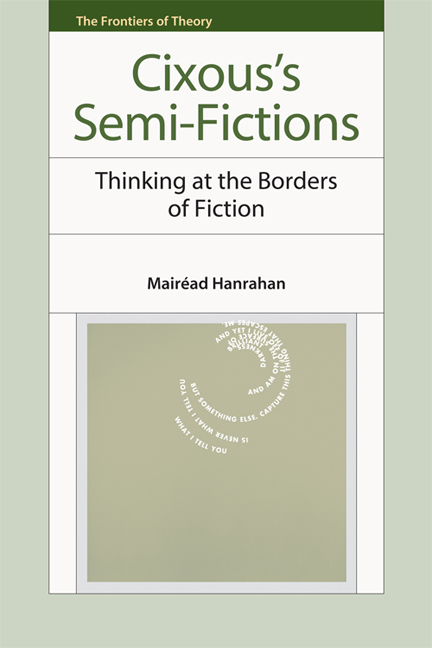Book contents
1 - Introduction
Published online by Cambridge University Press: 05 August 2016
Summary
Where do we situate Hélène Cixous? Where is her place? I deliberately begin this book at a tangent, since place will not be its core preoccupation, nor even a dominant line of inquiry. These questions of place could furthermore be deemed out of place in other ways. Their ontological form, which presupposes that a categorical answer exists, may seem an inappropriate way to approach a writing that passionately and powerfully resists any attempt to pin it down, as anyone who has ever opened one of Cixous's texts must immediately be aware. If she has a place, it is one that is always more than one, a place of connection between different places. For example, what Cixous terms the ‘sol originaire, le pays natal de [s]on écriture’ [‘the originary ground, the native country of [her] writing’] is above all a space of intersections: not only does she owe her existence to a chance encounter in Paris between her Sephardic North African father and Ashkenazi European mother, but the Oran in which she grew up was a space ‘au bord de l'Afrique du Nord’ [‘at the edge of North Africa’], where the North meets the South, where Catholics, Arabs and Jews were in constant contact with each other and her ear was daily nourished by a diversity of languages. The world which formed her was an irreducibly plural space, as exemplified in the name of her grandfather's shop:
Aux Deux Mondes, The Two Worlds. So the boutique was dedicated, and I with it, to a universe with two worlds. But I never knew in a clear, explicit or decisive way which the two were. The world was two. All the worlds were two and there were always two to begin with. There were so many twoworlds.
In addition, this differential, relational space was double in another crucial sense. The ‘paradis’ [‘paradise’]5 of her childhood was also always already exile; as we shall explore in Chapter 6, her place of origin was never hers.
The place of origin at stake in the quotation above is specifically the native country, not of Cixous herself, but of her writing. A disconcerting aspect to this metaphor is that writing originates (metaphorically) in Cixous's own ‘real’ birthplace: its metaphorical place of origin is a place which is not a metaphor (or at least not only a metaphor).
- Type
- Chapter
- Information
- Cixous's Semi-FictionsThinking at the Borders of Fiction, pp. 1 - 18Publisher: Edinburgh University PressPrint publication year: 2014



